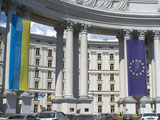Ukraine’s New President Looks 'Weast'
By Jeremy Druker for ISN
Following his victory in an election runoff on 7 February, in which he narrowly defeated Prime Minister Yulia Tymoshenko, editorial writers whipped out their pens and forecast Ukraine’s reorientation toward Russia.
Indeed, soon after the election commission confirmed the results, Russian President Dmitry Medvedev invited Yanukovych to Moscow, probably expecting the prompt setting of a date for a visit immediately after the inauguration.
The press also ran with that narrative. Reuters, for example, wrote: “If Yanukovich accepts the invitation, it could be his first foreign trip as president, reinforcing expectations that he will steer the former Soviet republic back towards Moscow's orbit.”
So what does Yanukovych do? He decides to sneak in a visit to Brussels first, and a high-profile one at that, with meetings set for 1 March with Herman Van Rompuy, the president of the European Council, and José Manuel Barroso, the president of the European Commission, among others.
He and his minders are trying hard to rid Yanukovych of the pro-Russian label, even through the publication of an external pageopinion piece by the president-electcall_made in the 17 February edition of The Wall Street Journal.
In the article, Yanukovych wrote: “Ukraine should make use of its geopolitical advantages and become a bridge between Russia and the West […]. We should not be forced to make the false choice between the benefits of the East and those of the West […].The re-establishment of relations with the Russian Federation is consistent with our European ambitions.”
For all the skeptics who might doubt the sincerity of those words, Yanukovych may have provided a reminder that it was, in fact, his government in 2006 that managed to give a fresh impetus to EU-Ukraine relations through launching negotiations on a new agreement. He also could have admitted (but never would, of course) that his oligarch backers want access to EU markets, and he will do his best to accommodate them.
One thing that Yanukovych undoubtedly had right in his opinion piece was his statement: “If we hope to join the European Union we must secure political stability and establish ourselves as an economically viable nation.”
The country has been a mess over the past few years, with constant political bickering, an imploding economy and corruption that knows few boundaries. Friendly relations with Russia would not necessarily be a detriment to eventual EU membership, but more short-lived governments that fail to deliver on reform would be.
Stability, so far, looks hard to come by. Tymoshenko dropped her court challenge against the election results, but remains defiant, refusing to step down as prime minister and calling Yanukovych a puppet of the oligarchs.
The president-elect himself hasn’t exactly calmed down the current situation, taking the controversial decision of inviting the Moscow-based head of the Russian Orthodox Church, Patriarch Kirill, to hold a service to mark his inauguration. That has not gone down well with Ukrainian nationalists and has also needlessly inflamed religious tensions.
For all the talk of East and West, the difficulty of that foreign policy balancing act might actually pale in comparison with the domestic challenges that await.

